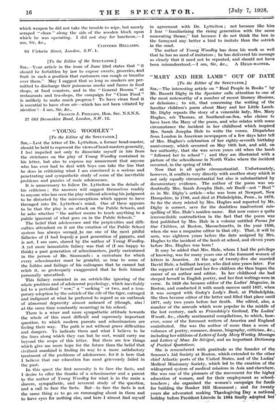"YOUNG WOODLEY"
[To the Editor of the SPECTATOR.] SIR,—Lest the letter of Dr. Lyttelton, a former head-master, should be held to represent the views of head-masters generally, I feel impelled not only to dissociate myself in toto from the strictures on the play of Young Woodley contained in his letter, but also to express my amazement that anyone who has ever had to deal with boys can take the line that he does in criticizing what I am convinced is a serious and penetrating and sympathetic study of some of the inevitable problems and puzzles of male adolescence.
It is unnecessary to follow Dr. Lyttelton in the details of his criticism ; the answers will suggest themselves readily to anyone who has seen the play without allowing his judgment to be distorted by the misconceptions which appear to have thronged into Dr. Lyttelton's mind. One of these appears to be that the play is an attack on the Public Schools, and he asks whether " the author means to teach anything to a public ignorant of what goes on in the Public Schools."
The belief that adolescence and the perplexities and diffi- culties attendant on it are the creation of the Public School system has always seeined„to me one of the most pitiful fallacies of (I had hoped) A past generation of .pntsi and is not, I am sure, shared, by the author of Young Woodley. A yet more lamentable fallacy was that of (I ana happy to think) a past generation of schoolmasters, justly caricatured in the person - of Mr. Simmonds ; a caricature for which every schoolmaster must be grateful, so true to some of the foibles and failings of his colleagues that he cannot but relish it, so grotesquely exaggerated that he feels himself personally unscathed.
This fallacy. consisted in an ostrich-like ignoring of the whole problem and of adolescent psychology, which inevitably led to a periodical " row," a "'sacking " or two, and a tem- porary adoption by the ostrich of the role of the tiger, outraged and indignant at what he preferred to regard as an outbreak of abnormal depravity almost unheard of (though, alas I at the same time constantly recurring) in his school.
There is a wiser and more sympathetic attitude towards the whole of this most difficult and supremely- important
question, to which modern parents • and schoolmasters are feeling their way. The path is not without grave difficulties and dangers. To indicate them and what I believe to be the lines along which they can but be met, would carry me beyond the scope of this letter. But there are few things which give me more hope for the future than the belief that civilized mankind is finding its way to a more satisfactory treatment of the problems of adolescence, for it is here that I believe that our education has most grievously failed in the past, - •
In this quest the first necessity is to face the facts, and
I desire to offer the thanks of a schoolmaster and a parent to the author of Young Woodley for what is in the main a ancere, sympathetic, and reverent study of the question, and a call to face the facts. But—to face the facts is not the same thing a; to go on rummaging about in them and to have eyes for nothing else, and here I almost find myself
in agreement with Dr. Lyttelton ; not because like him J fear " familiarizing the rising generation with the same nauseating theme," but because I do not think the hen in the farmyard any. better a bird to imitate than the ostrich in the sand. • ,
The author of Young Woodley has done his work so well that he has no need of imitators ; he has delivered his message so clearly that it need not be repeated, and should not have been misunderstood.—I am, Sir, &c., A HEAD-MASTER.












































 Previous page
Previous page